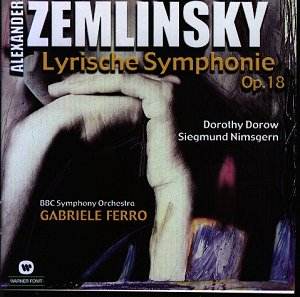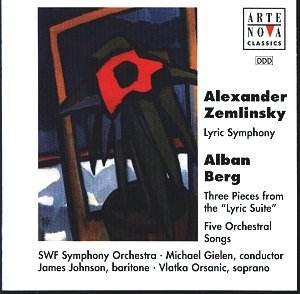Over the last decade or so there has been increasing
interest in the music of Alexander Zemlinsky, with a number of
recordings appearing - particularly of his Lyric Symphony.
In fact this Warner Fonit reissue(?) of a 1978 BBC Symphony Orchestra
performance will soon face competition from a shortly to be released
Chandos recording.
Zemlinsky was more often known for his friendship
with Schoenberg (he married Zemlinsky’s sister) and as one of
the teachers of Korngold. His talent was admired and encouraged
by Mahler. In fact Zemlinsky’s Lyric Symphony strongly
resembles Mahler’s Song of the Earth. The Lyric Symphony
uses mystical poetry (by Rabindranath Tagore) of the East speaking
of dreamlike recollections of love.
The Warner Fonit recording of Zemlinsky’s Lyric
Symphony faces stiff opposition from the outstanding bargain
Arte Nova album that also includes the Berg pieces for good measure.
The opening song for baritone who is "athirst for faraway
things" and romantic adventure, employs huge orchestral resources
that Michael Gielen unleashes with ferocity and passion in a reading
that is more intense and faster than Ferro’s although the BBC
Symphony Orchestra’s response is not low on voltage either. The
Arte Nova sound has the edge too. Of the two baritones, both with
attractively arresting timbres, Nimsgern is more subtly expressive
and traces a more persuasive and sinuous vocal line.
The second song has a besotted young girl trying
to attract the attention of a prince as he passes beneath her
window. Gielen captures all her dreaming and yearning and then
despair as the prince passes on oblivious of her attentions, in
a glittering, voluptuous then crushing evocation as the prince’s
chariot drives over the jewel she had thrown in his path. In the
early section, Ferro’s recording is dreamier and more languid
as the girl ecstatically prepares herself and awaits the approach
of the prince. Dorothy Dorrow has a lyric soprano’s sweetness
suitable for the innocence of a young girl impossibly in love
while a deeper timbred Vlatka Orsanic is more volcanic in Gielen’s
more urgent pacing and more dramatic approach. But again Ferro
excites strongly too as the prince’s chariot unheedingly rushes
by.
Zemlinsky’s third song has the baritone dreaming
of his beloved and reflecting, "You are the evening cloud
floating in the sky of my dreams." The music very Mahler-like
here, yet not unlike Richard Strauss and Korngold too, is a perfumed,
floating sensuality as Ferro dallies over 7’:14" while Gielen
presses forward in 5’:27" allowing Johnson to be more persuasively
passionate, and opulent. The fourth song, a nocturne beginning
with a lovely violin solo sounds a note of sadness as the soprano
sighs, "Speak to me, my love!...I will clasp your head to
my bosom…the night will pale…The day will dawn. We shall look
at each other’s eyes and go on our different paths…" Zemlinsky
weaves orchestra magic here evoking a still, sylvan scene yet
with slightly disturbing spectral ripples. The soprano line is
beautifully merged into the instrumental fabric. One is reminded
not only of Mahler but also the nocturnes of Respighi and Korngold.
Ferro’s slower reading (by some 90 seconds) accentuates the sweet
despair more deeply while Gielen opts for a more romantic approach;
both sopranos are most persuasive.
In strong contrast, the fifth song has the baritone
anxious to break the silken bonds of love, "Free me from
the bonds of your sweetness … free me from your spells and give
me back the manhood to offer you my freed heart." The music
is brutal as the baritone is impatient to be free. Both conductors
compel the music forward in just over 1:50 with both baritones
terse and strident. Just as harsh is the soprano’s vindictive
response that is the sixth song. Both sopranos are viperish as
they scornfully dismiss their fickle lovers and their mounting
fury erupts spectacularly, especially by Gielen. The final song
with the baritone, more conciliatory, returns to the mood of the
first with "Peace, my heart … let love melt into memory and
pain into songs…O Beautiful End … I bow to you and hold up my
lamp to light you on your way." Nimsgern and Ferro are most
affecting while Gielen in the closing pages more strongly implying
that the lover is also anticipating fresh conquests.
Here I must complain about the very limited documentation
for both releases. The Warner Fonit album has detailed erudite
notes on Zemlinsky and his Lyric Symphony but includes
texts of the songs only in German and Italian. The Arte Nova release
has no song texts at all and the notes are poor and cursory. A
third, mid-priced recording of Zemlinsky’s Lyric Symphony
again with Michael Gielen conducting, this time, the BBC Symphony
Orchestra with Elisabeth Söderström and Thomas Allen
(with the same composer’s Six Maeterlinck Songs) released
on BBC Radio Classics in 1996 also leaves out the texts. It seems
that only full priced recordings of the Lyric Symphony have texts.
These are serious omissions and false economies by recording companies
– they only serve to frustrate and anger customers who really
need the texts to appreciate Zemlinsky’s achievement.
Gielen’s readings of the Alban Berg pieces included
on the Arte Nova recording are equally persuasive. The Lyric
Suite pieces, after the Zemlinsky composition, are colourful
and lyrical; experimenting with twelve-tone technique and frequently,
in Gielen’s Andante amoroso, and in the tremolandi and
pizzicatos of the Allegro misterioso, I was reminded of
Bernard Herrmann’s musical language for Hitchcock’s Psycho
and Vertigo. The oddly named Five Orchestral Songs after
postcard texts is more experimental and abrasive. Described
as a "subtly constructed work which invokes a doomsday atmosphere
by means of extreme drama" it pitches a lyrical soprano line
against a grotesque or violent or coldly remote musical landscape.
Although the newer Warner Fonit recording of
the Zemlinsky Lyric Symphony has much to recommend it including
two impressively expressive soloists, I marginally prefer the
dramatic power of Gielen’s Arte Nova recording in splendidly vivid
sound.
Ian Lace

![]() Dorothy Dorow (soprano)
and Siegmund Nimsgern (baritone)
Dorothy Dorow (soprano)
and Siegmund Nimsgern (baritone) ![]() WARNER FONIT 0927 43405-2
[48:01]
WARNER FONIT 0927 43405-2
[48:01] 
![]() Vlatka Orsanic (soprano)
and James Johnson (baritone)
Vlatka Orsanic (soprano)
and James Johnson (baritone) ![]() ARTE NOVA 74321 27768
2 [66:07]
ARTE NOVA 74321 27768
2 [66:07]